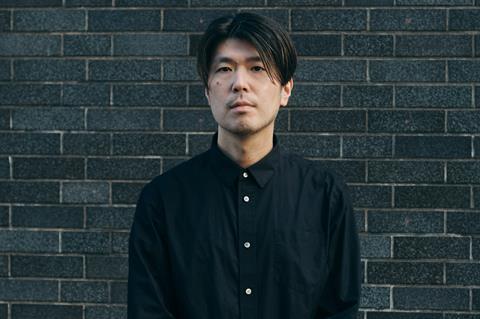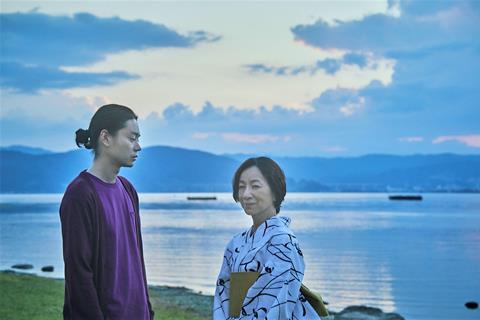
A Hundred Flowers, playing in Official Selection at San Sebastian, marks the first time Japan’s Genki Kawamura has sat in the director’s chair.
Kawamura is a familiar name to fans of recent Japanese cinema, having helped shepherd live-action films including Confessions and Parasyte, plus anime hits such as Your Name and Belle, to success as producer. He’s also an accomplished novelist: his debut novel If Cats Disappeared From The World has sold over two million copies worldwide.
A Hundred Flowers is based on a novel Kawamura penned in 2019. It concerns a woman beginning to suffer the effects of dementia and her complicated relationship with her son.
Kawamura was inspired to write the novel when his own grandmother was diagnosed with Alzheimer’s disease. “When I went to see her, she asked me, ‘Who are you?’ which was a shock. But I also became interested in what kind of world she was seeing in her own mind,” says Kawamura.
Discussing family memories with his grandmother, Kawamura brought up a time when they visited the sea. She corrected him, saying it was actually a lake, and to his surprise, a look at the family photo album proved her right. “It made me realise that I, too, had forgotten things, and that humans live by forgetting and rewriting their own memories,” says Kawamura. “I thought that could be something quite powerful in terms of dramatic storytelling.”
Shooting techniques
Early in the process of adapting his novel for the screen, Kawamura landed on the concept of shooting long takes, with key scenes made up of a single shot, albeit with quick flashbacks briefly interrupting those shots.
“In our real lives, there are no cuts,” says Kawamura. “At the same time, we’re having this conversation, but I’m also thinking about the fried egg I ate earlier. The human brain remembers things quite haphazardly, hence the single-shot scenes punctuated by memories.”
The other technique Kawamura used to visualise the world of a person suffering from dementia was to create scenes that repeat over and over, like a drum machine set on loop. In one scene, for example, Harada’s character makes several identical trips through a supermarket, putting the same groceries in her cart and telling the same set of twins to stop running though the aisles. Kawamura created these looping scenes, he says, in order to “connect things that normally have no connection.”
Pulling off such complicated shots took an intense amount of preparation and diligence on the part of his camera, set design and special effects teams, says Kawamura. But the real challenge, he says, was for the actors to be as spontaneous and real as possible within those tightly planned-out shots.
“When I spoke to my grandmother, she would be talking about one thing, then suddenly switch to another topic, like the weather changing,” says Kawamura. “I wanted that same level of humanity, of reality.”

That humanity is also what led Kawamura, despite his high reputation in the world of Japanese animation, to choose live action for his directorial debut.
“I knew things like the actors’ physicality were going to be essential,” says Kawamura. “Plus, it would be extremely difficult to execute the ‘one shot, one scene’ concept in animation.”
That doesn’t mean, however, that the execution was a cakewalk in live action. For actors he knew could pull off the physicality and humanity he needed, Kawamura cast the acclaimed Mieko Harada and Masaki Suda, known for their collaborations with directors Akira Kurosawa and Shinji Aoyama, respectively. But even they found things quite challenging at times.
“I got a lot of complaints about how hard it was,” says Kawamura with a laugh. “Ms. Harada would say things like, ‘You know, [Akira] Kurosawa never asked for [this many takes].’ Bringing up Kurosawa, now that’s unfair! How could I possibly respond to that?”
Cinematic experience
Despite the difficulty, Kawamura was determined to shoot the film in his unique style in order, he says, to remind people of “what only a cinematic experience can do.”
“During the pandemic, people started watching more movies at home on streaming services,” says the director. “Those services are invested in keeping people from clicking away, so they ask for quick editing, lots of music, and simple dialogue. I’ve done work for streamers, but for this film, I wanted viewers to concentrate and work their imaginations while watching along in a cinema.”
As producer, Kawamura is working on the English-language, US-set remake of the 2016 anime hit Your Name, which he also produced. “It feels kind of like what I did on A Hundred Flowers: translating one form of fiction to another without making it feel like ‘cosplay,’ without just copying-and-pasting it over. I’ve had a lot of interesting conversations with [producer] JJ Abrams and [writer] Eric Heisserer about how to do it right. We’re moving forward thoroughly with that in mind.”
























No comments yet